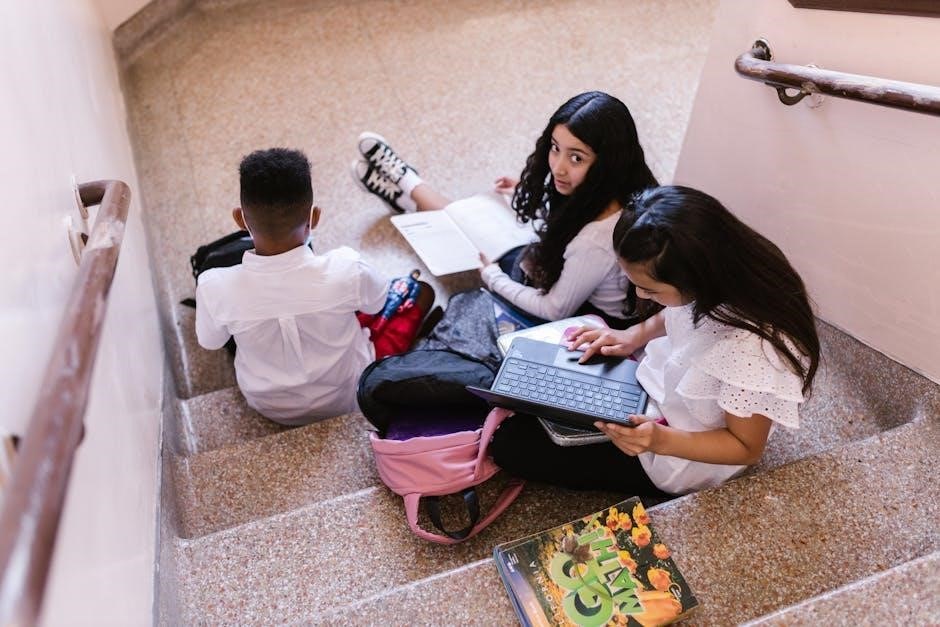the seven habits of highly effective teens pdf

the seven habits of highly effective teens pdf
, a guide for teens to master essential life skills and achieve their full potential.
Overview of the Book
The Seven Habits of Highly Effective Teens is a self-help book designed specifically for teenagers, offering practical advice to improve their personal and social lives. Written by Sean Covey, the book adapts the principles from his father Stephen Covey’s famous work, The 7 Habits of Highly Effective People, tailoring them for younger audiences. The book is structured into seven key habits, each focusing on essential skills and mindsets that empower teens to take control of their lives. It covers topics like self-discipline, goal-setting, and effective communication, while addressing common challenges teens face, such as peer pressure and self-esteem. The habits are divided into three sections: Private Victory (Habits 1-3), Public Victory (Habits 4-6), and Ultimate Victory (Habit 7). The book is filled with real-life examples and actionable steps, making it a relatable and inspiring guide for teens seeking to improve their lives.
Author Background: Sean Covey
Sean Covey, the author of The Seven Habits of Highly Effective Teens, is a renowned motivational speaker, educator, and writer. Born into a family of leaders, Sean is the son of Dr. Stephen Covey, the celebrated author of The 7 Habits of Highly Effective People. Sean has carried forward his father’s legacy by adapting these timeless principles for a younger audience. With a strong educational background, including an MBA, Sean has dedicated his career to empowering teens and young adults. His expertise lies in understanding the challenges of adolescence and providing practical, relatable advice. Through his book, Sean has become a trusted voice for millions of teenagers worldwide, helping them navigate life’s complexities with confidence and purpose. His work continues to inspire and equip teens with the tools they need to succeed.
Target Audience: Teens and Young Adults
The Seven Habits of Highly Effective Teens is specifically designed for teenagers and young adults, addressing the unique challenges they face during adolescence. The book serves as a practical guide to help teens navigate issues such as peer pressure, self-esteem, and academic stress. By focusing on personal growth and development, it equips young readers with essential life skills to achieve their goals and build strong relationships. Sean Covey’s relatable approach makes the content accessible and engaging, offering advice on topics like time management, communication, and resilience. The book also resonates with young adults transitioning into independence, providing them with a roadmap to success and fulfillment. Its universal principles have made it a valuable resource for millions of young people worldwide, helping them overcome obstacles and unlock their potential.

The Seven Habits: An Overview
The Seven Habits of Highly Effective Teens introduces seven foundational principles designed to guide teens toward effectiveness in personal and social realms, fostering growth and success.
Habit 1: Be Proactive
Be Proactive is the first habit, emphasizing personal responsibility and initiative. It encourages teens to focus on what they can control—like their attitudes and actions—rather than blaming circumstances. By choosing how to respond to challenges, teens can build confidence and effectiveness. This habit is about taking charge of one’s life, fostering a mindset of accountability and empowerment. It serves as the foundation for the other habits, teaching teens to be solution-oriented and self-aware. Proactivity helps teens avoid being reactive, enabling them to make intentional decisions that align with their goals and values. This habit is crucial for developing self-discipline and resilience, key traits for long-term success.
Habit 2: Begin with the End in Mind
Begin with the End in Mind is the second habit, focusing on setting long-term goals and creating a clear vision for one’s life. It encourages teens to think deeply about their values and what they want to achieve. By developing a personal mission statement, teens can align their daily actions with their long-term aspirations. This habit teaches the importance of prioritizing and making decisions that reflect their core beliefs. It helps teens avoid being distracted by short-term temptations and instead stay focused on what truly matters. By starting with the end in mind, teens can create a roadmap for their future, ensuring their efforts are purposeful and meaningful. This habit builds self-awareness and direction, empowering teens to take charge of their lives and make intentional choices.
Habit 3: Put First Things First
Put First Things First focuses on effective time management and prioritization. It teaches teens to organize their tasks based on importance and urgency, using the Time Management Matrix, which categorizes activities into four quadrants: urgent and important, important but not urgent, urgent but not important, and neither urgent nor important. By focusing on what truly matters, teens can avoid wasting time on non-essential activities. This habit emphasizes the importance of scheduling and balancing schoolwork, relationships, and personal growth. It encourages teens to adopt a proactive approach to their responsibilities, ensuring they allocate their time wisely. By mastering this habit, teens can reduce stress, achieve their goals, and create a sense of control over their lives. It’s about making intentional choices that align with their values and long-term vision.
Habit 4: Think Win-Win
Think Win-Win is about seeking solutions where everyone benefits. It emphasizes collaboration, mutual respect, and understanding. Teens are encouraged to look for outcomes that satisfy all parties, fostering positive relationships and trust. This habit teaches the importance of empathy and compromise, helping teens navigate conflicts and build strong connections. By adopting a win-win mindset, teens can create environments where everyone feels valued and heard. It’s not about winning at the expense of others but finding solutions that benefit all. This habit promotes long-term success and stronger relationships, encouraging teens to think beyond their own needs and consider the impact of their actions on others. It’s a powerful approach to achieving personal and interpersonal goals effectively.
Habit 5: Seek First to Understand, Then to Be Understood
Seek First to Understand, Then to Be Understood focuses on the importance of empathy and effective communication. Teens are encouraged to listen deeply to others before expressing their own views. This habit teaches the value of understanding different perspectives, which fosters stronger relationships and resolves conflicts more effectively. By prioritizing understanding, teens can communicate more compassionately and avoid misunderstandings. It emphasizes that true connection begins with listening and seeking to see things from another person’s point of view. This habit helps teens build trust, improve their interpersonal skills, and become better friends, family members, and teammates. It’s about creating meaningful dialogue rather than just waiting for their turn to speak. Mastering this habit leads to deeper connections and more harmonious interactions.
Habit 6: Synergize
Synergize is about combining the strengths of individuals to achieve something greater than what could be accomplished alone. This habit emphasizes the power of teamwork, collaboration, and valuing diverse perspectives. Sean Covey explains that synergy happens when people work together, bringing their unique skills and ideas to the table, resulting in solutions that are better than any one person could create alone. It’s not just about cooperation; it’s about creating something new and innovative together. Synergy fosters creativity, strengthens relationships, and leads to greater success. Teens learn to embrace differences and build on each other’s strengths, understanding that the whole is greater than the sum of its parts. By synergizing, they can overcome challenges more effectively and achieve extraordinary results in both personal and group settings. This habit encourages teens to think collaboratively and celebrate the value of teamwork.
Habit 7: Sharpen the Saw

Sharpen the Saw focuses on self-care and personal growth, emphasizing the importance of regularly renewing and improving oneself. Sean Covey explains that this habit involves taking care of the four key dimensions of a person: physical, mental, social, and spiritual. By prioritizing these areas, teens can maintain their effectiveness and energy. This habit encourages activities like exercise, healthy eating, reading, spending time with loved ones, and reflecting on values and beliefs. Sharpening the Saw ensures that teens are well-rounded, balanced, and prepared to handle life’s challenges. It’s about creating a routine that nurtures growth and well-being, allowing teens to sustain their efforts in practicing the other six habits. By consistently sharpening their “saw,” teens can achieve long-term success and fulfillment in all areas of life. This habit is the foundation for continuous improvement and self-renewal.
Understanding the Habits in Depth explores how the seven habits work together to build self-discipline, strengthen relationships, and create a balanced life for long-term success and personal growth.
The Private Victory: Habits 1-3
The Private Victory: Habits 1-3 forms the foundation of personal growth and self-discipline. Habit 1: Be Proactive encourages teens to take responsibility for their choices and actions, focusing on what they can control. Habit 2: Begin with the End in Mind teaches setting long-term goals aligned with personal values, helping teens visualize their future. Habit 3: Put First Things First emphasizes time management and prioritizing what truly matters, fostering self-mastery. Together, these habits help teens develop independence, self-awareness, and integrity, laying the groundwork for success in all areas of life.
The Public Victory: Habits 4-6
The Public Victory: Habits 4-6 focuses on building strong relationships and achieving success through teamwork and understanding. Habit 4: Think Win-Win encourages teens to seek mutually beneficial solutions, fostering collaboration and trust. Habit 5: Seek First to Understand, Then to Be Understood emphasizes empathy and effective communication, teaching teens to listen deeply before expressing their own views. Habit 6: Synergize promotes combining strengths and perspectives to achieve something greater than individual efforts. Together, these habits help teens build meaningful connections, resolve conflicts, and work effectively with others. By mastering these habits, teens can create positive interactions and achieve shared goals, leading to lasting success in their personal and social lives.

The Ultimate Victory: Habit 7
Habit 7: Sharpen the Saw focuses on self-care and personal growth, emphasizing the importance of maintaining and enhancing well-being across four dimensions: physical, emotional, social, and spiritual. This habit encourages teens to engage in activities that promote renewal and improvement. Physical well-being involves regular exercise, a healthy diet, and adequate sleep. Emotional well-being is supported through reflection and positive thinking. Social well-being is about building and maintaining healthy relationships. Spiritual well-being involves connecting with core values and finding purpose. By prioritizing these areas, teens can achieve balance and harmony, leading to increased energy, better relationships, and a clearer mind. This habit ensures continuous growth and development, empowering teens to face challenges effectively and sustain the other habits. Investing in self-improvement enhances overall quality of life and achieves long-term success.

Practical Applications for Teens
Teens can apply the habits daily by setting personal goals, practicing time management, and fostering positive relationships. These strategies help build resilience and confidence for lifelong success.

Implementing the Habits in Daily Life
Teens can integrate the seven habits into their daily routines by starting small and being consistent. For example, Habit 1, Be Proactive, encourages teens to take responsibility for their choices and attitudes, fostering self-awareness. Habit 2, Begin with the End in Mind, can be practiced by setting clear, personal goals and visualizing success. Time management, as part of Habit 3, Put First Things First, helps teens prioritize tasks and balance schoolwork, extracurricular activities, and personal time. Habits 4-6 focus on interpersonal skills, such as listening actively and collaborating with others. Finally, Habit 7, Sharpen the Saw, reminds teens to care for their physical, emotional, and mental well-being. By applying these habits, teens can build resilience, improve relationships, and achieve their goals more effectively.
Overcoming Challenges and Obstacles
Teens often face numerous challenges, such as peer pressure, academic stress, and self-doubt. The seven habits provide practical tools to navigate these obstacles effectively. Habit 1, Be Proactive, empowers teens to focus on what they can control, reducing frustration over uncontrollable circumstances. Habit 2, Begin with the End in Mind, helps them stay focused on long-term goals, even when faced with short-term setbacks. Habit 5, Seek First to Understand, fosters empathy and communication, easing conflicts with others. Additionally, Habit 7, Sharpen the Saw, emphasizes self-care, ensuring teens maintain the energy and resilience needed to overcome challenges. By applying these habits, teens can build confidence, develop problem-solving skills, and transform obstacles into opportunities for growth and success.

The Impact of the Book
The book has transformed millions of lives globally, becoming a handbook for teens seeking self-esteem and success, offering practical advice to improve self-image and achieve goals effectively.

Reception and Reviews
The book has received widespread acclaim for its practical advice and relatable content. Teens and parents alike praise its ability to address real-life challenges, making it a beloved guide for self-improvement. Dr. Stephen Covey, renowned author of The 7 Habits of Highly Effective People, endorses his son Sean’s work, calling it a “remarkable book” and a “must-read.” Many reviewers highlight how the habits, such as Be Proactive and Seek First to Understand, have positively impacted their lives, helping them build confidence and better relationships. The book’s engaging style and actionable tips have made it a favorite among teenagers and educators, earning it a reputation as a transformative resource for personal growth. Its success has solidified it as a go-to guide for teens navigating the challenges of adolescence and beyond.
How the Book Has Helped Teens Worldwide
The 7 Habits of Highly Effective Teens has empowered millions of teenagers globally, providing them with essential tools to navigate adolescence and beyond. Teens have reported improved self-confidence, better relationships, and increased success in achieving their goals. The book’s practical advice, such as resisting peer pressure and building friendships, has resonated deeply. Many have credited the habits, like Be Proactive and Think Win-Win, with helping them overcome challenges and develop a growth mindset. Its global impact is evident, with teens from diverse backgrounds, including those in countries like Kenya, finding value in its teachings. The book’s ability to address universal teen struggles has made it a trusted resource, helping young people worldwide to thrive and reach their full potential. Its influence continues to grow, shaping a generation of confident, capable, and effective individuals.
The Seven Habits of Highly Effective Teens offers timeless wisdom, empowering teenagers worldwide to embrace self-discipline, responsibility, and effective relationships, fostering personal growth, resilience, and lifelong success.
Final Thoughts on the Seven Habits
The Seven Habits of Highly Effective Teens provides a practical roadmap for personal growth and success, equipping teens with timeless principles to navigate life’s challenges. By fostering self-awareness, responsibility, and empathy, these habits empower young people to build strong relationships and achieve their goals. The book’s focus on holistic development—mind, body, and spirit—ensures that teens are prepared to thrive in all areas of life. Its enduring popularity is a testament to the universal relevance of its teachings. Ultimately, the habits encourage teens to embrace their potential and create a fulfilling future, making it a must-read for anyone seeking to make a positive impact in their lives and the lives of others.
Encouragement for Teens to Adopt the Habits
Embracing the Seven Habits can be a transformative journey for teens, empowering them to take control of their lives and unlock their full potential. The book offers practical, relatable advice that resonates with the challenges of adolescence, making it easier for young people to adopt these habits. By starting small and being consistent, teens can gradually build the mindset and skills needed for long-term success. The habits encourage self-reflection, goal-setting, and positive relationships, which are essential for navigating the complexities of growing up. With patience and persistence, teens can master these habits, leading to improved self-esteem, better decision-making, and a clearer vision for their future. The ultimate reward is a life of purpose, balance, and fulfillment, making the effort to adopt the habits truly worthwhile.